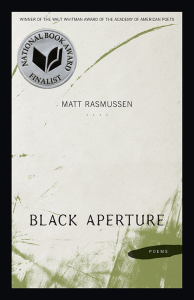 Black ApertureBy Matt Rasmussen
LSU Press
Black ApertureBy Matt Rasmussen
LSU Press
Reviewed by Jeremy Reed
By framing, reframing, changing angles, and returning to repeated images in Black Aperture, Matt Rasmussen leads us into questioning not only what’s within his poetic frame, but also what’s included in the notion of framing itself. Rasmussen's poetry pays specific attention to the world's daily iterations, approaching everyday images time and again in different forms, and in the process alters the perspectives of his readers. Through this repetition, he begins to make his readers aware of the world in the way that grief makes a person aware of the world - as liminal, contingent, bordering and not firm.
Certain images recur in Rasmussen’s book of poetry (wildlife and plant life, death, dark and light, shared hands, fire, time), less as obsession than as litany, showing how the border between the two is harder to parse than we normally tend to believe. These poems engage elegy by relentlessly choosing to spend time with grief, with the everyday as it looks surreally altered by grief’s aftereffects, with our emotions tinged both by grief and the humor that unexpectedly finds its way into it, and with the desire to release the speaking self from the hold of grief, along with all that word happens to contain.
And in Rasmussen’s poetry grief as a concept contains multiple meanings embodied by his lucid, while sometimes surreal, descriptions. Returning, for instance, to the themes of light and darkness, the speaker buries a light bulb only to have it bloom downward toward his dead brother. Returning to representations of telephones and answering machines, the speaker replaces his brother’s voice on the machine, and buries a telephone too, hoping to hear his brother on the other end and instead hearing only the breathing dirt. Nature intervenes repeatedly. The bodies of deer, blades of grass, the movement of fire over the constancy of dirt populate these poems around the moments when death enters in, recurs, is remembered.
Throughout Rasmussen’s book, “The concept of time starts over,” as he writes in “Vacation Cage.” Yet, throughout these variations on themes and images, voices and memories, the question of time and repetition falls away and returns until the reader is able to rest in the rhythm of the poetry’s voice and hear the hum these shared moments of escape and return elicit. The ways these movements color the daily living surrounding us make the reader see their own life anew. Black Aperture sits its reader down with it in a space made liminal by elegiac, simple descriptions slightly tilted away from normal experience while showing that our everyday forms of description are affected by other important frames: relation, perception, and perspective among them.
_________________________________________
Jeremy Reed is a master’s candidate in the literature program at The University of Montana.
Matt Rasmussen’s poetry has been published in Gulf Coast, Cimarron Review, H_NGM_N, Water~Stone Review, New York Quarterly, Paper Darts, and at Poets.org. He’s received awards, grants, and residencies from The Bush Foundation, The McKnight Foundation, The Minnesota State Arts Board, Jerome Foundation, Intermedia Arts, The Anderson Center in Red Wing, MN, and The Corporation of Yaddo. He is a 2014 Pushcart Prize winner, a former Peace Corps Volunteer, and teaches at Gustavus Adolphus College. His first book of poems, Black Aperture, won the 2012 Walt Whitman Award and was published in 2013 by LSU Press.
